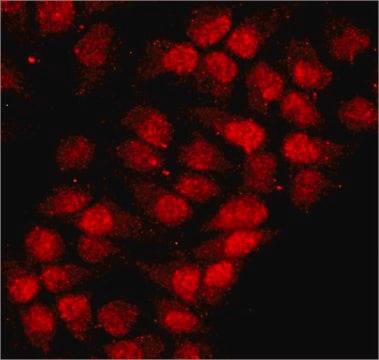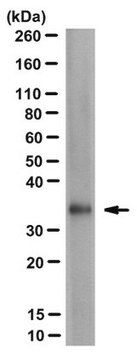R4653
Anti-hnRNP-A2/B1 antibody, Mouse monoclonal
clone DP3B3, purified from hybridoma cell culture
Synonym(s):
Anti-Heterogeneous Nuclear Ribonucleoprotein-A2/B1
About This Item
Recommended Products
biological source
mouse
conjugate
unconjugated
antibody form
purified immunoglobulin
antibody product type
primary antibodies
clone
DP3B3, monoclonal
form
buffered aqueous solution
mol wt
antigen ~36 kDa
species reactivity
rat, human, bovine, hamster, monkey, chicken, mouse, canine
technique(s)
immunocytochemistry: suitable
immunoprecipitation (IP): suitable
microarray: suitable
western blot: 1-2 μg/mL using total cell extract from 293T cell line
isotype
IgG2a
UniProt accession no.
shipped in
dry ice
storage temp.
−20°C
target post-translational modification
unmodified
Gene Information
human ... HNRNPA2B1(3181)
mouse ... Hnrnpa2b1(53379)
rat ... Hnrnpa2b1(362361)
General description
Immunogen
Application
- enzyme linked immunosorbent assay (ELISA)
- immunoblotting
- immunoprecipitation
- immunocytochemistry
Biochem/physiol Actions
Physical form
Disclaimer
Not finding the right product?
Try our Product Selector Tool.
Storage Class Code
12 - Non Combustible Liquids
WGK
nwg
Flash Point(F)
Not applicable
Flash Point(C)
Not applicable
Certificates of Analysis (COA)
Search for Certificates of Analysis (COA) by entering the products Lot/Batch Number. Lot and Batch Numbers can be found on a product’s label following the words ‘Lot’ or ‘Batch’.
Already Own This Product?
Find documentation for the products that you have recently purchased in the Document Library.
Our team of scientists has experience in all areas of research including Life Science, Material Science, Chemical Synthesis, Chromatography, Analytical and many others.
Contact Technical Service







